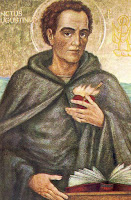Recently, I wrote on science as a Christian vocation, and in light of that piece, and particularly the one that followed, this excerpt from Martin Luther is, yes, blowing my mind ("Open Letter to the Christian Nobility of the German Nation Concerning the Reform of the Christian Estate")
Written in 1520, it's still relevant five centuries later...
From all this it follows that there is really no difference between laymen and priests, princes and bishops, "spirituals" and "temporals," as they call them, except that of office and work, but not of "estate"; for they are all of the same estate -- true priests, bishops and popes -- though they are not all engaged in the same work, just as all priests and monks have not the same work.This is the teaching of St. Paul in Romans 12:4 and I Corinthians 12:12, and of St. Peter in I Peter 2:9, as I have said above, viz., that we are all one body of Christ, the Head, all members one of another. Christ has not two different bodies, one "temporal," the other "spiritual." He is one Head, and He has One body.Therefore, just as Those who are now called "spiritual" -- priests, bishops or popes -- are neither different from other Christians nor superior to them, except that they are charged with the administration of the Word of God and the sacraments, which is their work and office, so it is with the temporal authorities -- they bear sword and rod with which to punish the evil and to protect die good.A cobbler, a smith, a farmer, each has the work and office of his trade, and yet they are all alike consecrated priests and bishops, and every one by means of his own work or office must benefit and serve every other, that in this way many kinds of work may be done for the bodily and spiritual welfare of the community, even as all the members of the body serve one another.





